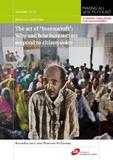| dc.contributor.author | Joshi, Anuradha | |
| dc.contributor.author | McCluskey, Rhiannon | |
| dc.date.accessioned | 2017-12-18T15:39:40Z | |
| dc.date.available | 2017-12-18T15:39:40Z | |
| dc.date.issued | 2018-01 | |
| dc.identifier.citation | Joshi, A. and McCluskey, R. (2018) The art of ‘bureaucraft’: Why and how bureaucrats respond to citizen voice, Making All Voices Count Research Briefing, Brighton: IDS | en |
| dc.identifier.uri | https://opendocs.ids.ac.uk/opendocs/handle/20.500.12413/13446 | |
| dc.description.abstract | Despite the recent increase of empirical research and conceptual development in transparency and accountability, much of this has been on the side of citizen action, looking at why and how citizens mobilise around accountability demands and at what makes their actions successful. Comparatively, there has been much less work exploring the state side of the equation – to explain why and how public officials respond (or not) to citizen demands for accountability. There are a series of reasons why our understanding of responsiveness is limited, namely: the difficulty of clarifying which factors, among the multitude that shape bureaucratic behaviour, are likely to dominate in certain contexts; the lack of resources and accessibility when conducting systematic research into bureaucracies and their responsiveness; the difficulty of separating capacity and willingness when looking at bureaucrats’ responsiveness. The aim of this research briefing is to highlight some of the more prominent issues
related to bureaucratic responsiveness, particularly in relation to a ‘willingness to respond’. The authors review the relevant literature on public sector responsiveness, and use a set of interviews with ‘reformists’ within government to make three contributions. First, they present a simple framework for thinking about the conflicting pressures that public officials face in their work which shape how likely they are to respond to citizens’ demands. Second, the paper argues that the way that public officials see citizens and their claims (in terms of legitimacy, credibility and level of trust) directly influences their willingness
to respond to citizen claims. Finally, the authors show that if and when public officials are willing to respond to citizens, they make use of their political and social capital to devise a series of strategies to mobilise responsiveness within the state through what we call bureaucraft: the art of manoeuvring diplomatically within complex organisational and individual incentives
that pervade state bureaucracies – in other words, the bureaucratic equivalent of statecraft. | en |
| dc.description.sponsorship | DFID | en |
| dc.description.sponsorship | USAID | en |
| dc.description.sponsorship | Sida | en |
| dc.description.sponsorship | Omidyar Network | en |
| dc.language.iso | en | en |
| dc.publisher | Institute of Development Studies | en |
| dc.relation.ispartofseries | Making All Voices Count Research Briefing; | |
| dc.rights.uri | http://creativecommons.org/licenses/by-nc/4.0/ | en |
| dc.title | The art of ‘bureaucraft’: Why and how bureaucrats respond to citizen voice | en |
| dc.rights.holder | Institute of Development Studies | en |
| rioxxterms.funder | Default funder | en |
| rioxxterms.identifier.project | Default project | en |
| rioxxterms.version | NA | en |
| rioxxterms.funder.project | 9ce4e4dc-26e9-4d78-96e9-15e4dcac0642 | en |


